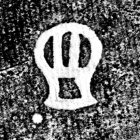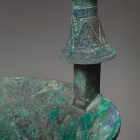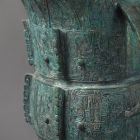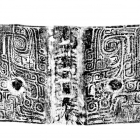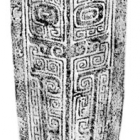J.J. Lally & Co., Oriental Art / New York City, New York
MenuPast Exhibition
Chinese Archaic Bronzes:
The Collection of Daniel Shapiro
March 14 - April 5, 2014
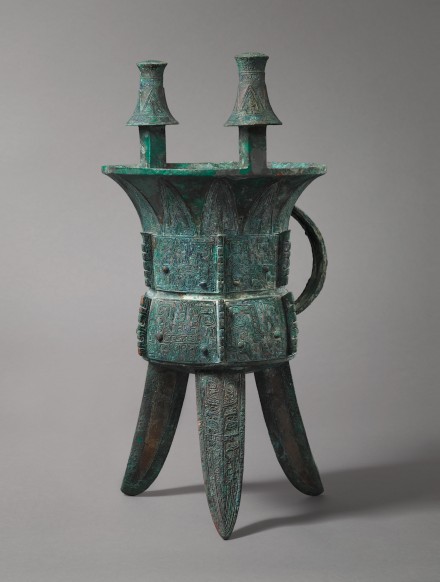
12.
JIA 斝
Shang Dynasty, 12th Century B.C.
the deep cylindrical bowl with gently rounded convex lower sides decorated with an elaborate repeating pattern of large dragons with long horns confronted on and separated by notched flanges to form three panels filled with taotie framed by pairs of smaller descending kui dragons, the dragons all with protruding rounded eyes and surrounded by densely packed leiwen scroll, below a slightly stepped-back second register with flat sides cast with a very similar frieze of dragons confronted to form taotie flanked by kui dragons, all bisected and framed by notched flanges, below a collar of scroll-filled cicada-blades rising on the flaring neck, the rim surmounted by a pair of diametrically opposed squared posts capped by tall truncated cones decorated with simplified cicada blades between running scroll borders and with whorl medallions on rounded tops, the rounded base of the bowl raised on three long splayed blade-shaped legs of triangular section, each cast on the outer face with simplified taotie with scroll horns above cicada motifs, all dissolved in dense scroll pattern, the inner faces of the legs with plain sides left open at the center, revealing the clay core, with a plain arched strap handle cast perpendicular to the side above one leg, the brightly mottled malachite green encrusted patina showing touches of azurite blue and small areas of reddish cuprite underlayer, the interior base with smooth silvery gray surface, cast with a single pictogram on the interior at the center of the base.
Height 16 3⁄4 inches (42.5 cm)
The single pictogram may be read as a clan sign.
Provenance
J. J. Lally & Co., New York, 2001
A very similar jia from the William Sturgis Bigelow Collection, now in the Museum of Fine Arts, Boston, is illustrated by Fontein and Wu in Unearthing China’s Past, New York, 1973, p. 34, no. 4.
Compare also the larger jia of very similar form and design in the Freer Gallery of Art, illustrated by Pope in the catalogue of The Freer Chinese Bronzes, Washington, 1967, Vol. I, pp. 119–125, no. 20.
Another jia of very similar form and similarly decorated, excavated at Anyang in 1952 and now in the Xinxiang City Museum, Henan province, is illustrated in Henan chutu Shang Zhou qingtong qi (The Unearthed Bronzes of Shang-Zhou Dynasty in Henan Province), Beijing, 1981, p. 259, no. 329, with caption on p. 54.
商 斝 高 42.5 厘米
Additional Images (Touch to enlarge)
